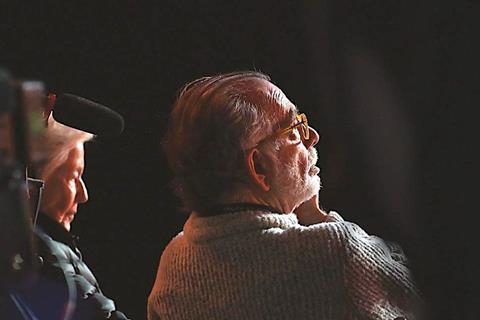This eye-opening look at the making of Coppola’s passion project screens in Venice Classics

Dir: Mike Figgis. US/UK. 2025. 107mins
When Francis Ford Coppola’s Megalopolis premiered at Cannes in 2024, the decades-in-the-making passion project was hailed and derided in equal measure. But Mike Figgis’ documentary of Megalopolis’ making isn’t concerned with that film’s outcome as much as Coppola’s unfiltered passion to bring his epic parable to the big screen. Even those who consider Megalopolis a disaster may well be enraptured by Megadoc, which offers a candid, compassionate look at the creative process itself — that delicate, uncertain time on a film set when no one involved knows if they are headed for greatness or calamity.
Offers a candid, compassionate look at the creative process itself
Megadoc screens in Venice before opening in the US on September 19 through Utopia, and StudioCanal secured remaining worldwide rights ahead of the fim’s premiere. The film will cater chiefly to cinephiles — perhaps the same who enjoy Hearts Of Darkness, the 1991 documentary about another troubled Coppola production, Apocalypse Now. But prospective viewers should know that Figgis neither makes the case for Megalopolis’ brilliance nor weaves a cautionary tale of its failure. This neutral approach is, in fact, one of the documentary’s strengths.
Coppola had been trying to put together Megalopolis since the early 1980s, and when he announced production would finally commence in 2021, after he sold a substantial stake in his wine company to self-finance the $120 million budget, Figgis (Leaving Las Vegas) inquired about documenting the Atlanta shoot. Granted permission, Figgis observes Coppola on set while occasionally interviewing the director, the stars and the crew about the experience.
Periodically, we see interludes in which Figgis records himself commenting on what he’s witnessing, at one point noting that the best documentaries about films concern productions that went badly. His remark will draw comparisons to Hearts Of Darkness, which detailed Apocalypse Now’s arduous gestation – but because that embattled 1979 war film is now considered a classic, that portrait of a creatively floundering Coppola has a built-in happy ending. By contrast, it is too early to know if critics will eventually rush to embrace Megalopolis, which bombed commercially and received many negative reviews.
For now, Megadoc is sensitive to just how hard it can be to make a good film. Because Figgis is himself a filmmaker, he is adept at getting actors to open up about their methods, and it’s compelling to watch Coppola stage some of Megalopolis’ more memorable scenes. In Figgis’ conversations with stars Adam Driver, Aubrey Plaza, Shia LaBeouf and others, he hears enthusiasm for Coppola’s lofty aspirations and reverence for his legendary stature.
But Megadoc includes enough hints of potential problems. Now 86, Coppola complains during a complicated shot that he’s too old and grumpy for a modern film set. In a separate interview, initial production designer Beth Mickle talks about the director’s indecision. Such on-set frustrations are commonplace on film shoots, and Megadoc does not add undue weight to these moments. But once Coppola decides to cut costs and fire part of his production and effects team, including Mickle, Figgis does pick up on growing tensions. (The film does not, however, discuss the allegations of on-set misconduct leveled at Coppola, which he denied, that surfaced before the film’s premiere.)
The most notable of these flare-ups is between Coppola and LaBeouf, who repeatedly challenges the director regarding motivation and movement within scenes. Early on, LaBeouf confesses to Figgis that he was “persona non grata” in the industry because of his personal behaviour and he’s grateful that Coppola gave him a chance, but, soon after, the actor is combative in a way that may make the average viewer side with Coppola in their debates.
Figgis incorporates footage from Coppola’s earlier attempts to get Megalopolis off the ground — notably, a 2001 table read and some 2003 scenes of Ryan Gosling in the LaBeouf role. But Megadoc – which concludes just as Megalopolis is about to have its red-carpet unveiling at Cannes – resists sentimentalising Coppola’s long journey with this project and, likewise, Coppola is refreshingly matter-of-fact as he discusses his ambitions and process. This is not the brash maverick shown in Hearts Of Darkness, but he remains a thoughtful artist trying to fulfil a dream. By depicting Coppola simply as a diligent director at work, Megadoc is ennobling without being hagiographic.
Production companies: Red Mullet and Red Mullet and American Zoetrope
International sales: Red Mullet, Tara Li-An, tara@red-mullet.com
Producers: Tara Li-An, James Mockoski
Cinematography: Mike Figgis
Editing: Joe Beshenkovsky
Music: Mike Figgis
























